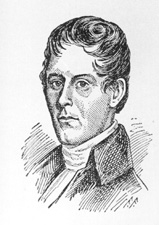Powhatan Ellis
Powhatan Ellis | |
|---|---|
 | |
| Judge of the United States District Court for the District of Mississippi | |
| In office July 14, 1832 – January 5, 1836 | |
| Appointed by | Andrew Jackson |
| Preceded by | Peter Randolph |
| Succeeded by | George Adams |
| United States Senator from Mississippi | |
| In office September 28, 1825 – January 28, 1826 | |
| Preceded by | David Holmes |
| Succeeded by | Thomas B. Reed |
| In office March 4, 1827 – July 16, 1832 | |
| Preceded by | Thomas B. Reed |
| Succeeded by | John Black |
| Personal details | |
| Born | January 17, 1790 Amherst County, Virginia |
| Died | March 18, 1863 (aged 73) Richmond, Virginia |
| Political party | Jacksonian |
Powhatan Ellis (January 17, 1790 – March 18, 1863) was a United States Senator from Mississippi and a United States federal judge.
Early life
Powhatan Ellis was born on January 17, 1790, at "Red Hill" in Amherst County, Virginia. Some accounts deemed him to be a descendant of Pocahontas.[1] He graduated from Washington Academy (now Washington and Lee University) in 1809, attended Dickinson College in Carlisle, Pennsylvania in 1809 and 1810, receiving an A.B., and studied law at the College of William & Mary in 1813 and 1814. He was a lieutenant in the Prevost Guards of Virginia in 1814.
Career
He was admitted to the bar and commenced practice in Lynchburg, Virginia; he moved to Natchez, Mississippi in 1816, and to Winchester, Mississippi later that year, continuing the practice of law in both places.
He served as a judge of the Mississippi Supreme Court at several time between 1817 and 1825. He was again appointed to the United States Senate to fill the vacancy caused by the resignation of David Holmes,[1] and served from September 28, 1825, to January 28, 1826, when a successor was elected and qualified; he was an unsuccessful candidate for election to fill the vacancy. He was elected to the Senate and served from March 4, 1827, to July 16, 1832, when he resigned to accept a judicial position.
On July 13, 1832, President Andrew Jackson nominated him to a seat on the United States District Court for the District of Mississippi vacated by Peter Randolph. He was confirmed by the United States Senate on July 14, 1832, and received his commission the same day. He resigned on January 5, 1836.
He was appointed by President Andrew Jackson as Chargé d'affaires of the United States to Mexico. He served in that capacity from January to December 1836, when he closed the legation. He was appointed by President Martin Van Buren as United States Minister Plenipotentiary to Mexico,[1] holding that office from 1839 to 1842.
He then engaged in the private practice of law in Natchez, Mississippi until at some point he moved to Richmond, Virginia. He continued in private practice there until his death in 1863.
Death
He died on March 18, 1863, in Richmond, Virginia.[1] He was buried at Shockoe Hill Cemetery.
Legacy
The city of Ellisville, Mississippi is named in his memory.[2][3]
References
- ^ a b c d Thomas H. Somorville, "A Sketch of the Supreme Court of Mississippi", in Horace W. Fuller, ed.,The Green Bag, Vol. XI (1899), p. 504.
- ^ Who Was Who in America, Historical Volume, 1607-1896. Chicago: Marquis Who's Who. 1963.
- ^ Gannett, Henry (1905). The Origin of Certain Place Names in the United States. Govt. Print. Off. p. 117.
- Powhatan Ellis at the Biographical Directory of Federal Judges, a publication of the Federal Judicial Center.
- United States Congress. "Powhatan Ellis (id: E000136)". Biographical Directory of the United States Congress.
- 1790 births
- 1863 deaths
- People from Amherst County, Virginia
- Mississippi Jacksonians
- Mississippi Supreme Court justices
- United States Senators from Mississippi
- Judges of the United States District Court for the District of Mississippi
- United States federal judges appointed by Andrew Jackson
- 19th-century American judges
- 19th-century American diplomats
- Washington and Lee University alumni
- Dickinson College alumni
- William & Mary Law School alumni
- Democratic-Republican Party United States Senators
- Mississippi Democratic-Republicans
- Ambassadors of the United States to Mexico
- People from Lynchburg, Virginia

